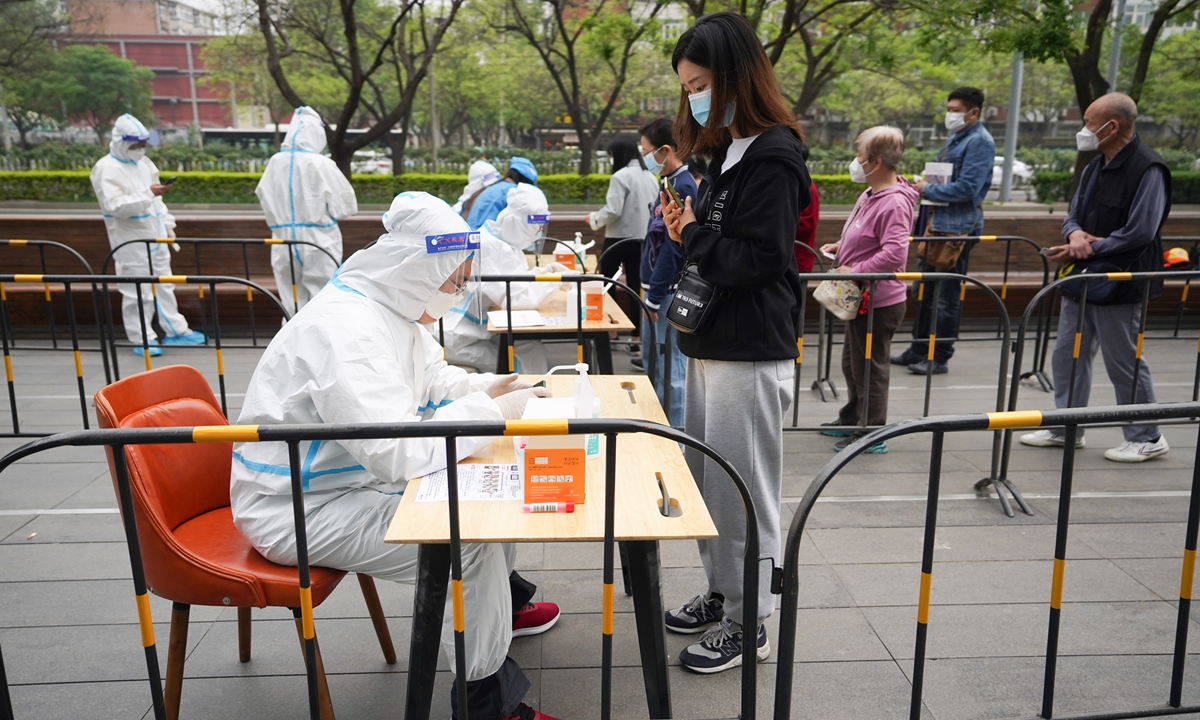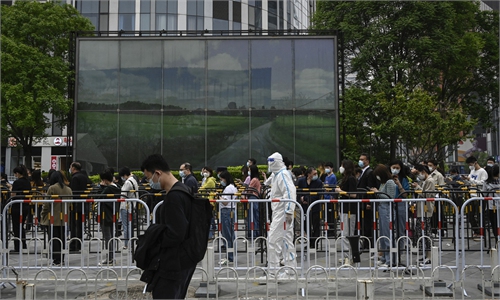Beijing races against time in combating COVID-19 with new rounds of testing
Capital tightens anti-epidemic measures by suspending in-person classes, normalizing nucleic acid tests

Staff members register for residents before nucleic acid test at a testing site in Chaoyang District, Beijing, capital of China, April 25, 2022.Photo:Xinhua
As the epidemic situation in Beijing remains severe and complex, the Chinese capital city has been racing against time to carry out more rounds of massive nucleic acid testing in order to screen out all the potential risks of transmission as early as possible, in line with the country's dynamic zero-COVID policy. The city also tightens up anti-epidemic measures by suspending on-site teaching in primary and secondary schools as well as kindergartens, and some districts are about to kick off the 10th round of massive testing from Tuesday.Though the city recorded a double-digit increase of daily new infections, epidemiologists said that the overall situation is under control thanks to the fast response and decisive measures, which could help cut off the hidden transmission routes, as the Omicron variant usually causes mild cases. Normalization of nucleic acid testing is also seen as an effective approach in curbing transmission when there are still high risks at the community level.
Beijing continued to tighten control over the latest COVID-19 flare-up, after more local infections were reported in the city, in particular, a bank in Shunyi district reported cluster infections that involved 21 cases in six districts on Monday.
The latest round of the outbreak in Beijing is large with people infected widely distributed in the capital city. The chain of transmissions has not been interrupted and the risk of cluster infections remains the biggest challenge of epidemic prevention and control, Beijing health authorities said at a press conference.
The city reported 50 local infections from 3:00 pm on Sunday to 3:00 pm on Monday, including 41 in control personnel and nine in community screening. The latest round of the outbreak in Beijing has recorded a total of 777 infections since April 22, involving 15 districts.
The cluster outbreak in Shunyi involves 21 cases concerning the Beijing Rural Commercial Bank's data center in the district, which has spread into two districts including 17 staff members and four family members. Tian Hui, vice president of the bank, apologized at a press conference, saying that the outbreak exposed loopholes in the bank's anti-epidemic work.
Shunyi, like its neighboring Chaoyang district, also issued a "work from home" advisory for local residents to reduce transmission risks. The district also finished nucleic acid testing among about 1.2 million people on Sunday with all negative results, and it will have another round of tests on Tuesday.
Beijing will continue to strengthen epidemic prevention and control in public places. Residents entering these places are required to provide 48-hour nucleic acid negative testing certificates from May 12, Beijing health authorities said.
Starting from Tuesday, Beijing will provide citywide nucleic acid testing divided by districts and dates.
Sun Chunlan, the vice premier who has been supervising the country's anti-epidemic work, urged authorities at all levels on Monday to adhere to the dynamic zero-COVID policy unswervingly and adopt resolute measures to identify outbreaks as early as possible and curb them in order to ensure the epidemic situation is under control.
She also urged clearing all infections at the community level as soon as possible and enhancing the alarm system. Also, in big cities, more nucleic acid testing spots should be set up within the reach of most residents who could take frequent tests by only walking 15 minutes.
Local authorities said on Sunday that since April 25, Beijing has held nine rounds of region-wide mass nucleic acid tests. A Beijing-based immunologist who preferred not to be identified told the Global Times on Monday that as the variant continues mutating, it also affects the current effectiveness of nucleic acid testing, adding challenges for massive screening.
"For example, there was a mother and a daughter who tested positive after five times," he said. "Also, there's been community transmission before, a major issue now is that we are not fully aware of all the potential transmission risks."
Li Ang, a deputy director of the Beijing Health Commission, said at the press conference that recently, certain nucleic acid testing agencies did not promptly test the results and some reports were inaccurate. Some lacked strict management of their labs, which all severely affected the tests' quality and the results of the anti-epidemic work.
Such problems have to be handled in accordance with laws and regulations, and those institutions are required to suspend operations, Li said.
Large-scale nucleic acid testing is still necessary for the current situation, where the risk of the spread of the epidemic is relatively high. It is an important method to effectively control the spread of the epidemic and find the source of transmission in the short run, Wang Guangfa, a Beijing-based respiratory specialist, told the Global Times on Monday.
Many of the nucleic acid tests carried out on a large scale in Beijing are mixed tests, which will not reduce the sensitivity of the test, but will greatly improve its efficiency he said.
While districts are carrying out new rounds of massive tests, all restaurants continue to suspend dining-in services across the city, performances, entertainment venues, gyms and internet cafes will also be temporarily closed, and some shopping malls and parks have also announced the suspension of business, as the city tightens COVID-19 prevention measures to combat the latest flare-up.
Besides, primary and secondary schools, kindergartens, and secondary vocational schools in Beijing will be temporarily suspended and teaching will be carried out online, officials said at the conference.
The Omicron variant is characterized by mild symptoms, especially as the proportion of the population vaccinated increases, making early detection of people infected more difficult, Wang said.
He warned against the relaxation of the prevention and control just because there are too many mild cases, as such a "let-it-be" mentality increases the chances of infection in people with underlying diseases and in the elderly, thereby raising the risk of fatality.


